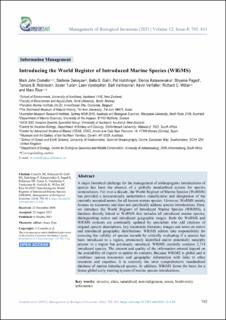Introducing the World Register of Introduced Marine Species (WRiMS)
Costello, Mark John; Dekeyzer, Stefanie; Galil, Bella S.; Hutchings, Pat; Katsanevakis, Stelios; Pagad, Shyama; Robinson, Tamara B.; Turon, Xavier; Vandepitte, Leen; Vanhoorne, Bart; Verfaille, Kevin; Willan, Richard C.; Rius, Marc
Peer reviewed, Journal article
Published version
Permanent lenke
https://hdl.handle.net/11250/2983065Utgivelsesdato
2021Metadata
Vis full innførselSamlinger
Originalversjon
Costello, M. J., Dekeyzer, S., Galil, B. S., Hutchings, P., Katsanevakis, S., Pagad, S., Robinson, T. B., Turon, X., Vandepitte, L., Vanhoorne, B., Verfaille, K., Willan, R. C. & Rius, M. (2021). Introducing the World Register of Introduced Marine Species (WRiMS). Management of Biological Invasions, 12(4), 792-811. doi: 10.3391/mbi.2021.12.4.02Sammendrag
A major historical challenge for the management of anthropogenic introductions of species has been the absence of a globally standardised system for species nomenclature. For over a decade, the World Register of Marine Species (WoRMS) has provided a taxonomically authoritative classification and designation of the currently accepted names for all known marine species. However, WoRMS mainly focuses on taxonomy and does not specifically address species introductions. Here, we introduce the World Register of Introduced Marine Species (WRiMS), a database directly linked to WoRMS that includes all introduced marine species, distinguishing native and introduced geographic ranges. Both the WoRMS and WRiMS contents are continually updated by specialists who add citations of original species descriptions, key taxonomic literature, images and notes on native and introduced geographic distributions. WRiMS editors take responsibility for assessing the validity of species records by critically evaluating if a species has been introduced to a region, erroneously identified and/or potentially naturally present in a region but previously unnoticed. WRiMS currently contains 2,714 introduced species. The amount and quality of the information entered depend on the availability of experts to update its contents. Because WRiMS is global and it combines species taxonomic and geographic information with links to other resources and expertise, it is currently the most comprehensive standardised database of marine introduced species. In addition, WRiMS forms the basis for a future global early warning system of marine species introductions.

